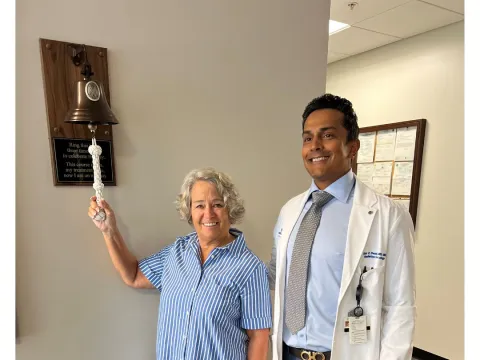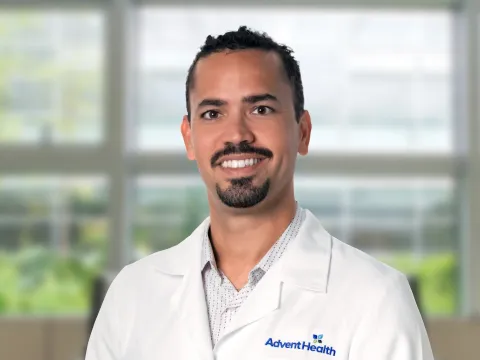- Jose Luis Dieppa
ORLANDO, Fla. - Colorectal cancer is one of the leading causes of deaths in the United States, according to the American Society of Colon and Rectal Surgeons. However, it is highly preventable with regular screenings and is often curable when detected early.

“Colorectal cancer often begins with the formation of a polyp within the lining of the colon wall— small growths or lumps that grow with time and potentially extend beyond the colonic wall and into adjacent organs if not promptly detected,” said Dr. Norbert Garcia, board-certified colon and rectal surgeon at AdventHealth. “While most polyps are benign, some can develop into cancer if not detected and removed.”
Dr. Garcia shares five key facts everyone should know about colorectal cancer:
Most colon cancers are asymptomatic: In the early stages, colorectal cancer may not cause any noticeable symptoms. However, there are specific symptoms that should prompt you to visit your doctor. These include most commonly rectal bleeding, abdominal pain, change in bowel habits and unexpected weight loss.
Risk factors: Consumption of fatty foods, excessive carbohydrates and processed foods, in addition to morbid obesity and smoking.
Genetics and family history: Most colorectal cancers are found in people without a family history. However about 3-5% of patients have a hereditary form of colorectal cancer, elevating the risk much higher than that of the general population. Although the standard age to begin screening is now 45, hereditary forms of colorectal cancer will require even earlier screening. The risk is even higher in first-degree relatives and if the diagnosis is made before the age of 50.
Prevention: Regular colorectal cancer screenings are key to prevention, with colonoscopy being the gold standard. Additionally, maintaining a healthy diet, staying physically active and limiting alcohol consumption may help reduce the risk.
- Treatment: When detected early, colorectal cancer is often curable, mostly by state-of-the-art techniques such as minimally invasive surgery.
“Early detection saves lives — talk to your doctor about screening options for you today,” said Garcia.
Recent News

AdventHealth named among U.S. News & World Report’s fifth annual 2026 Best Hospitals for Maternity Care
This marks the third year in a row AdventHealth Shawnee Mission has appeared on the U.S. News & World Report’s list of Best Hospitals for Maternity Care.

AdventHealth Waterman strengthens access to expert specialty care with expansion of Mount Dora medical plaza
Second floor buildout adds orthopedics, sports medicine, women’s health and heart care for Lake County

Expanding hope through innovation: AdventHealth advances cancer care across East Florida
Cancer touches nearly every family, and in Flagler, Lake and Volusia counties, the demand for timely, advanced care keeps rising. AdventHealth’s East Florida Division, which includes seven hospitals...

A new chapter begins: AdventHealth Avista opens its on-campus surgery center
This milestone marks a meaningful new chapter for a team whose history stretches back more than two decades.

AdventHealth Porter Performs Rare, Complex Robotic Kidney Cancer Surgery
AdventHealth Porter has reached an extraordinary milestone in surgical innovation, completing what is believed to be the first robotic left radical nephrectomy with inferior vena cava (IVC)...

Amanda Robinson, DO, joins AdventHealth Medical Group Family Medicine, Internal Medicine & Pediatrics at Curtis Parkway
AdventHealth is pleased to announce that Amanda Robinson, DO, has joined AdventHealth Medical Group Family Medicine, Internal Medicine & Pediatrics at Curtis Parkway.

New hospital brings world-class, whole-person care to Minneola
AdventHealth Minneola will bring nationally recognized care close to home in South Lake County.

New surgeon expands local access to advanced colorectal care in Volusia County
Dr. Mark Heimberger joins AdventHealth as part of its continued investment in bringing minimally invasive and robotic colorectal treatment options to the region’s growing community.

AdventHealth Lake Placid launches Low Dose Lung Screening CT program to help detect cancer early
AdventHealth Lake Placid has launched a new Low Dose Lung Screening CT program, bringing this life-saving service closer to home for people who live in and around Lake Placid.

Delivering on the mission: AdventHealth Supply Chain and Business Services' impact is part of every patient story
Every day, more than 1,500 Supply Chain and Business Services team members work behind the scenes with more than 3,000 suppliers to support how AdventHealth patients receive care.

Albit Paoli, MD joins AdventHealth Medical Group Orthopedics & Sports Medicine
AdventHealth is pleased to announce that Albit Paoli, MD, has joined AdventHealth Medical Group Orthopedics & Sports Medicine at Calhoun and AdventHealth Medical Group Orthopedics & Sports Medicine at...

AdventHealth expands access to primary care in the heart of DeLand
AdventHealth has opened a new Primary Care+ location in the heart of downtown DeLand, giving residents a simple way to get everyday care close to where life happens. The primary care practice offers...
